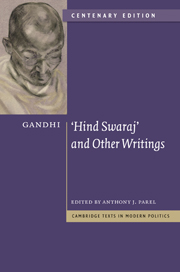Book contents
- Frontmatter
- Contents
- Preface to the centenary edition
- Acknowledgements
- Editor's introduction to the centenary edition
- Editor's introduction to the 1997 edition
- A note on the history of the text
- Principal events in Gandhi's life
- Biographical synopses
- Guide to further reading
- Glossary and abbreviations
- HIND SWARAJ
- Contents
- Preface to the English translation
- Foreword
- I The Congress and its officials
- II The Partition of Bengal
- III Discontent and unrest
- IV What is Swaraj?
- V The condition of England
- VI Civilisation
- VII Why was India lost?
- VIII The condition of India
- IX The condition of India (cont.): railways
- X The condition of India (cont.): the Hindus and the Mahomedans
- XI The condition of India (cont.): lawyers
- XII The condition of India (cont.): doctors
- XIII What is true civilisation?
- XIV How can India become free?
- XV Italy and India
- XVI Brute force
- XVII Passive resistance
- XVIII Education
- XIX Machinery
- XX Conclusion
- I APPENDICES
- SUPPLEMENTARY WRITINGS
- Bibliography
- Index
V - The condition of England
Published online by Cambridge University Press: 05 October 2014
- Frontmatter
- Contents
- Preface to the centenary edition
- Acknowledgements
- Editor's introduction to the centenary edition
- Editor's introduction to the 1997 edition
- A note on the history of the text
- Principal events in Gandhi's life
- Biographical synopses
- Guide to further reading
- Glossary and abbreviations
- HIND SWARAJ
- Contents
- Preface to the English translation
- Foreword
- I The Congress and its officials
- II The Partition of Bengal
- III Discontent and unrest
- IV What is Swaraj?
- V The condition of England
- VI Civilisation
- VII Why was India lost?
- VIII The condition of India
- IX The condition of India (cont.): railways
- X The condition of India (cont.): the Hindus and the Mahomedans
- XI The condition of India (cont.): lawyers
- XII The condition of India (cont.): doctors
- XIII What is true civilisation?
- XIV How can India become free?
- XV Italy and India
- XVI Brute force
- XVII Passive resistance
- XVIII Education
- XIX Machinery
- XX Conclusion
- I APPENDICES
- SUPPLEMENTARY WRITINGS
- Bibliography
- Index
Summary
reader: Then from your statement I deduce that the Government of England is not desirable and not worth copying by us.
editor: Your deduction is justified. The condition of England at present is pitiable. I pray to God that India may never be in that plight. That which you consider to be the Mother of Parliaments is like a sterile woman and a prostitute. Both these are harsh terms, but exactly fit the case. That Parliament has not yet of its own accord done a single good thing, hence I have compared it to a sterile woman. The natural condition of that Parliament is such that, without outside pressure, it can do nothing. It is like a prostitute because it is under the control of ministers who change from time to time. Today it is under Mr Asquith, tomorrow it may be under Mr Balfour.
reader: You have said this sarcastically. The term ‘sterile woman’ is not applicable. The Parliament, being elected by the people, must work under public pressure. This is its quality.
editor: You are mistaken. Let us examine it a little more closely. The best men are supposed to be elected by the people. The members serve without pay and, therefore, it must be assumed, only for the public weal. The electors are considered to be educated, and, therefore, we should assume that they would not generally make mistakes in their choice. Such a Parliament should not need the spur of petitions or any other pressure.
- Type
- Chapter
- Information
- Gandhi: 'Hind Swaraj' and Other Writings , pp. 29 - 32Publisher: Cambridge University PressPrint publication year: 2009

